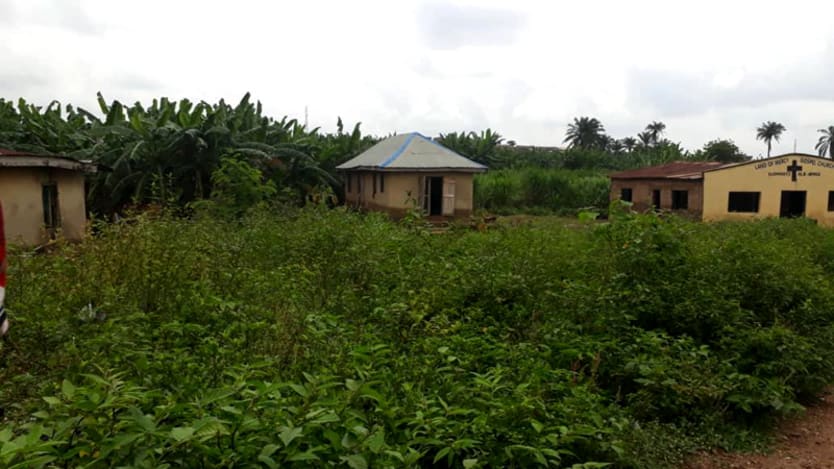Pregnant women in Nigeria are shunning medical centers. Here's why.

IBADAN, Nigeria — As early as 7 a.m., five pregnant women are already in the small building a few meters away from the Land of Mercy Gospel Church Ile Anu, in a heavily populated but rural area of Ibadan, southwest Nigeria.
The church is quite popular in the neighborhood, but the clinic beside it is better known, though it only has one bed. Its statewide fame is a result of the woman in charge. Olaide Eyinjujesu, or Eyinju as she is commonly known, heads the Association of Community Birth Attendants in Oyo State — a 10,000-strong association whose members deliver more babies than public hospitals, and have a complicated relationship with medical professionals.
Nigeria has one of the highest maternal mortality rates in the world, in part because of limited assistance from certified medical professionals during childbirth. In this two-part series, we look at why that is, and what can be done about it.
The road to Eyinju’s clinic is a narrow path flagged on both sides by leafy shrubs. From a distance it looks abandoned, but inside, the building is bubbling with activity. Eyinju's picture hangs on the wall.
Devex visited the clinic four times over a period of three weeks. Pregnant women dropped in regularly — not because they needed medical assistance, but simply because they were happy to be around Eyinju.
“I don’t work. I’m a stay-at-home wife. Anytime I’m bored, I come to greet Eyinju,” Taiwo Yemisi, one of the women, said.
Creating a welcoming environment gives community birth attendants across Nigeria an edge over medical facilities, and Eyinju is proud of it. “Unlike nurses in the hospitals who can shout at their patients, we are very close to our patients because we live in the community with them. They tell us their problems,” she said.
CBAs are involved in the daily lives of their patients. They delivered some of them, attended their wedding ceremonies, and worship at the same churches and mosques. Some of these institutions have set up mission houses where pregnant women from the congregation can attend antenatal classes and deliver their babies.
The CBA culture is part of the reason why only 35 percent of births in Nigeria are assisted by “skilled health personnel,” according to the United Nations Children’s Fund, in a country with one of the highest maternal mortality rates in the world, at 814 deaths per 100,000 live births. Moreover, gaps in record-keeping between birth attendants and medical professionals suggest the official data may not be capturing everything.
A CBA training program recognized by the state government involves three weeks of theory and two weeks of practicals, at a cost of 15,000 Nigerian naira, around $41. Most of the CBAs that Devex spoke to in Ibadan said they were attracted by the respect, reverence, and authority that people such as Eyinju enjoy in the community.
A silent feud
CBAs’ relationship with government is less positive, however. Devex attended three monthly meetings of the birth attendants, each of which started with prayers, music, and then complaints from members who had been harassed, arrested or extorted by officials who accused them of operating illegally.
At the health ministry’s primary health care board, which oversees CBAs’ activities, officials told Devex some of the attendants refuse to abide by the rules. For example, many administer injections despite being prohibited from doing so, one official claimed, alleging that some also carry out illegal abortions. “We cannot allow this to go unchecked in our communities,” said the official, who did not wish to be named because of political sensitivities.
When the state government first started intervening in the work of CBAs in 2013, they required patients to be referred to government health care centers in case of emergency. But according to Eyinju, patients said they were insulted by health officials there.
“They were insulting us and were telling our patients not to patronize us again. That was when trouble started,” she told Devex. “We also realized that they don’t have much capacity for emergency cases at the primary health centers,” and ended up referring cases elsewhere. “That was how we severed ties with them.”
Now, the only time CBAs cross paths with health care officials is for routine immunization and family planning services, in addition to training sessions organized by the government. CBAs are regulated on a state-by-state basis, but the pattern has been similar elsewhere.
As primary health centers across Nigeria have limited capacity and are regularly affected by industrial action, the health ministry eventually allowed CBAs to identify nearby private hospitals they could refer to in an emergency.
Academy Hospital and Maternity Center is one of those. Its database contains details of up to 200 CBAs in Ibadan. Dr. Olasunkanmi Adesina, the hospital’s chief, described several instances of pregnant women being referred to his hospital only to refuse treatment without approval from their birth attendant or pastor.
That happens especially in the case of a cesarean section, an unpopular procedure in Nigeria which is often advised against by CBAs and pastors through fear of surgery. In such cases, women usually go back to the mission house. You will not see her again until something goes wrong during the delivery and she is rushed to hospital, Adesina said.
Eyinju disagrees. She recounted an instance when a pastor’s wife discharged herself from hospital after being told the baby would be delivered via cesarean. “They brought her to me and she delivered twins after two hours of labor,” Eyinju smiled.
Adesina acknowledged this can happen. “Nature has its way of rectifying things,” he said. Perhaps “9 out 10 will be fine [but] we have to take care of everyone as if they are the one that will not be fine.”
Yet such cases are often presented by birth attendants as evidence of “miracles,” emboldening other women in the congregation to bypass medical advice. Medical practitioners claim that the largely unregulated activities of CBAs are leading to unnecessary deaths. In May 2018 alone, Adesina said, four pregnant women who went to CBAs were brought to his hospital dead. Several other health practitioners in the city told Devex they are witnessing a similar trend at their clinics.
However, a review of documents recording the number of babies delivered by CBAs in Ibadan showed no pregnant woman died in their care. There were no cases of stillbirths, either.

In each of three cases checked by Devex, the reason for this anomaly was the exploitation of a “window period.” Patients are usually rushed to hospital when something is going wrong. If they die between leaving the care of the birth attendant and arriving at the hospital, it is not captured in either set of records.
As a result of this and other shortcomings, Adesina described Nigeria’s maternal mortality data as a conservative estimate. “What they are reporting is a tip of the iceberg,” he said.
Integrating CBAs into the health care system
Insofar as public health facilities have been largely excluded from the CBAs’ referral system, CBAs have themselves been excluded from Nigeria’s central health care system. The implications are widely felt in areas such as immunization and the low uptake of family planning methods, two key areas where CBAs could play an important role.
More on maternal mortality:
► The 2 women entrepreneurs tackling maternal mortality in Nigeria
► Tackling the hidden cause of maternal mortality in Nigeria
► A new public-private partnership drug stirs hope to curb maternal mortality
Eyinju told Devex the relationship between birth attendants and the government ends with data reporting and training. Over a period of two months, Devex visited 16 centers managed by CBAs in Ibadan. None of them had been visited by health officials on a monitoring exercise. Some have been operating for decades, treating hundreds or thousands of patients, without any government official inquiring about what services are being rendered.
That responsibility is undertaken by CBAs themselves, who have organized into groups and meet monthly to discuss issues and receive training from organizations such as the African Development and Empowerment Foundation, or AfricanDEF, which is liaising with the state government to integrate CBAs into the health care system.
AfricanDEF Executive Director Dr. Victoria Adepoju said a total of 4,600 CBAs have been trained on how to identify early signs of danger in pregnancy and to provide basic family planning services.
“Working with CBAs made us [realize] that they are always enthusiastic and are willing to learn as much as they can if given the opportunity. It is their job and they are willing to improve their practice. They conceal most of the bad data in order to avoid crucifixion from the police and health workers,” she explained.
Adesina and Adepoju agreed that CBAs are a critical component of Nigeria’s health care system and cannot be ignored or sidelined. Both said the government should do more to improve their practice.
“Knowing how many birth attendants are in the state is not enough. Attending their meetings is not enough,” Adesina said “In this state, the last time [local government] training was conducted for the birth attendants was in 2009. On our part, we are actively seeking the birth attendants, adding them to our database and doing as much as we can for them. If Nigeria is really serious about ending maternal mortality, we have to integrate the CBAs into the health care system, train them and properly monitor them."
Search for articles
Most Read
- 1
- 2
- 3
- 4
- 5








